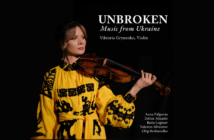
This page is also available in / Cette page est également disponible en:
![]() Francais (French)
Francais (French)
Canada boasts a vast, vibrant choral community—with countless professional and amateur choral organizations of all sizes scattered across the country. Among the most exciting places to be a choral singer, conductor, or lover of the choral arts is Toronto, Ont.
It comes as no surprise that the country’s largest city would be ripe with choral activity. Jamie Hillman, U of T head of choral studies, describes it as “an international hub for artistic and cultural work.” Toronto is home to some of the country’s oldest choral organizations, such as the Toronto Mendelssohn Choir. Founded in 1894 by Augustus Vogt, the Juno-winning and Grammy-nominated group has provided volunteer and professional choral singers with high-quality performance experience for over 125 years. At once committed to programming canonical masterworks and new music, the group, currently led by Jean-Sébastien Vallée, has recently inaugurated the TMSingers, a chamber group of 24 professional singers that splits off from the larger choir (which has roughly 100 auditioned volunteer members) for a couple of concerts every year.
The desire to combine the traditional configurations and repertoires of choral music with new, innovative presentations and commissions runs as a common thread across the city’s choral organizations, such as the Exultate Chamber Singers and the Amadeus Choir of Greater Toronto.
Conducted by Kathleen Allan, alongside associate conductor Nila Rajagopal, the Amadeus Choir makes a point to present experimental concerts of new and existing repertoire. Among this year’s concerts is a special performance of Andrew Downing’s score of the 1922 silent film Nosferatu. Associate conductor Rajagopal says this is one of the concerts she is most looking forward to this year. “The project still feels like a bit of a mystery, which makes it one of the most exciting,” she said. Later this year, the choir will perform their second annual Song Walk: Braiding Voices. The immersive, outdoor experience is a collaboration with singer, composer, and Inuk Knowledge Keeper Deantha Edmunds. Rajagopal remembers last year’s Song Walk with fondness. “It was a big, unpredictable event, but we had a vision for it, which finally came together on the day-of, and it was fantastic,” she said.

Rajagopal is one of five conductors of yet another exciting Toronto choir, the newly minted Modern Sound Collective (MSC, formerly known as the Mississauga Summer Chorale). Dedicated entirely to the promotion and performance of contemporary (usually Canadian) choral music, the group was founded in 2015 by conductor and artistic director Kai Leung. Leung, along with conductors Meredith Wanstall, Nathan Gritter, Emily Parker, Tyrese Walters, Katie Hatanaka, and Rajagopal, leads the organization’s five groups, which offer music-making opportunities in various configurations, at different levels, to primarily young artists and professionals. With such an extensive artistic team, the group’s very existence emphasizes what Rajagopal calls the “magic of collaboration.”
This community of musicians, both professional and amateur, is sustained by the city’s high-level choral training programs. At the youth level, groups such as the Toronto Children’s Chorus and Young Voices Toronto provide children as young as six with the opportunity to explore their voices, perform at a high level, collaborate with other musical groups, and develop skills in sight singing and music theory. Hillman describes the “children’s choirs in the city” as “particularly inspiring.” The Toronto Children’s Chorus, founded in 1978, has been doing this work for more than 40 years. Led by artistic director Zimfira Poloz, the Toronto Children’s Chorus consists of three divisions: four training choirs (for children ages six to 12), three main choirs (12+), and the Toronto Youth Choir. Rajagopal has been involved with the organization for many years, and conducted two of its training choirs through the 2022-23 season. “Getting to be part of a child’s first experience with a choir is very special,” she says, noting the responsibility she feels toward making their experience a positive one. “At that age, their minds are so fresh, and they transform over the course of the year. My priority is that they love it—that they want to come back.”

Most of them do, some moving on to study music at the secondary and post-secondary levels. Fortunately, both York University and the University of Toronto offer world-class programs in both vocal studies and choral conducting. U of T’s Choral Studies department, invites students to participate in one—or more—of its four choirs: the MacMillan Singers, Chamber Choir, Soprano/Alto Chorus, and Tenor/Bass Chorus. This year, U of T looks forward to “welcoming a new conductor for our Soprano/Alto Chorus, Kathleen Allan,” says Hillman.
Toronto really has something for everyone as far as choral activity is concerned. Those interested in singing in treble choir might look to the Echo Women’s Choir or Oriana Women’s Choir, while tenors and bass can turn to the Toronto Welsh Male Voice Choir. Vesnivka Choir, meanwhile, is the country’s leading Ukrainian women’s choir. For new singers, interested in trying out choir for the first time, community groups such as the Harbourfront Chorus, or the West Toronto Community Choir might be a good fit. Meanwhile, young professionals will find a community of people determined to keep high-level music-making in their lives at an Exultate Chamber Singers or Orpheus Choir of Toronto rehearsal. The list seems almost endless. The success of all of these organizations comes down to their ability to reach new audiences, and recruit new singers. “It’s important that people feel included and invited (through) free concerts and community events,” Rajagopal said.
These groups are united by more than a shared geography, though. Rajagopal and Hillman note that one of the joys of choral music in Toronto is how expansive it is. “At certain times of year, you can hear a compelling choral concert any night of the week. Many choirs in the city are doing innovative things. They acknowledge their histories and at the same time they are charting an exciting future,” says Hillman. “The scale of the city is unique,” she said , adding: “there is so much going on. There can be six amazing concerts on any given night; it’s unlike most cities.” And there is a kindness, she says, behind the music: “Everyone is so helpful and supportive; there’s no competitiveness. It’s a really positive space and community.” Choir, as always, serves to remind us just how much greater the whole can be than the sum of its parts.
This page is also available in / Cette page est également disponible en:
![]() Francais (French)
Francais (French)














